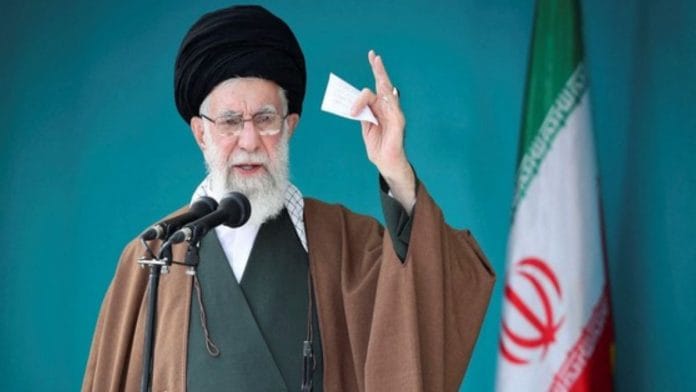On the night of 26 October, Israel launched anticipated strikes against Iran in a limited manner. Much against the rhetoric of targeting Iranian oil sources or nuclear plants, the Israeli Air Force chose military bases. It easily and swiftly covered a long distance to reach the country, and avoided the sensitive nerves of the Iranian regime. The real conundrum now is how Tehran chooses to respond to this. Will it counterattack? Does it seek an actual war for the sake of the Palestinian cause? Such questions beg us to explore the core agenda of Iranian foreign policy, and its militant advocacy for Palestine. On the face of it, and much like other countries, Iran speaks for peace, stability, and a rules-based international system that can help the region develop. But the reality is different.
Iran has a hidden agenda, which it seldom talks about but its neighbours can sense. The country wants to spread Shia teachings to promote the idea of pan-Islam, and position itself as the self-entitled leader of this movement. For example, on the occasion of Prophet Muhammad’s birth anniversary in September, Ayatollah Ali Khamenei, ‘the supreme leader’ of Iran, spoke for the Islamic Ummah. He expressed his concern for the ‘suffering’ of Muslim communities worldwide, including those in India, Gaza, and Myanmar. The Government of India, however, sharply criticised the reference to Indian Muslims, calling it “misinformed and unacceptable”. The Iranian leadership did not render any regrets to India, though.
Iran’s fantasy of leading the Muslim world, while preaching the supremacy of Shia Islam has caused suspicion and hostility among Arab nations, where the majority are Sunnis. Iranian religious agenda has consistently promoted conservative and radical Islam, whereas Gulf countries have been working toward making it more open. The United Arab Emirates is pioneering revolutionary changes in the Middle East by promoting new religious diplomacy. This is evident through initiatives such as the Ministry of Tolerance, and forums focusing on interfaith dialogue. The UAE, along with other Arab nations, has allied with the United States and Israel since the Abraham Accords of 2020. Fundamental ideological tensions with the Iranian religious Shia mission only strengthen this relationship.
This is precisely why Egypt, Jordan, Saudi Arabia, UAE, and Qatar have not sided with Iran in all these months. In some cases, they actually helped Israeli security when Iran launched its missile attacks.
Also read: After the Iran attack, a considerable relief among Israelis
Why Palestinians don’t trust Iran
The Palestinian leadership based in Ramallah – not Gaza, Qatar or Beirut – watch the Iranian involvement in their matters with suspicion and open condemnation. A majority of the Palestinians in West Bank and the East of Jerusalem are led by the internationally recognised Palestinian Authority and its ruling party Fatah. And they do not support Iran fighting their homeland’s fight. They distrust Ayatollah Khamenei and his revolutionary zealots.
Yasser Arafat, a legendary but controversial political leader, was secular in his approach. He didn’t lead the Palestinians to fight Israeli occupation for the sake of a ‘Holy Muslim Wakf Land’, or Jihad like Hamas. He accepted the two-state solution in 1988, allowing him to negotiate with Israel during the Oslo peace process and win the Nobel Peace Prize in 1994. In his complex struggle, Arafat sought to extract political and material support from the Iranian revolutionary corps in Lebanon after Iran established its proxies there following the 1979 revolution. Still, he could not share the Shia dreams of the Ayatollahs in Tehran.
Since 1979, Iran has used the Palestinian issue as a façade for its regional agenda to oppose American diplomacy, the Western world, and the existence of Israel. None other than Palestinian leader Mahmoud Abbas exposed Iran’s vested interests in the Israel-Hamas war. He directly attacked Khamenei’s statement, which hailed Hamas’ 7 October attack on Israeli civilians as successful. Khamenei’s comments, he said, “clearly announce that their [Iran’s] goal is to sacrifice the blood of Palestinians…and destroy Palestinian land”. Such actions won’t aid the Palestinian cause, he stressed. One can see how Iran’s involvement in the Israel-Hamas war has now taken the attention away from the ceasefire in Gaza and the release of Israeli hostages.
If anything, it has given a much-needed excuse to hawkish and Machiavellian leaders such as Benjamin Netanyahu to ignore domestic as well as international appeals for ending the war in Gaza. Moreover, Iran’s game plan has thrown Lebanon into the battlefield with Israel once again. Israel withdrew from southern Lebanon in 2000, agreeing to the United Nations-mediated international ceasefire agreement in 2006. But all that is in vain now.
Iran is playing disrupter for its own sake rather than the Palestinian cause. It did not wish to see the success of the Abraham Accords that normalised relations between Israel and the Arab states in 2020, and neither could it sit and watch the Israel-Saudi normalisation that was to happen in 2023-24. As a sovereign state, Iran can choose whatever agenda it wants. However, in its opportunism, it has promoted radical, jihadist and violent actors like Hamas, which weaken the secular, internationally recognised Palestinian national movement.
Dr Khinvraj Jangid writes from Tel Aviv. He is Associate Professor and Director, Centre for Israel Studies, Jindal School of International Affairs, OP Jindal Global University, Sonipat. He is visiting faculty at Ben-Gurion University of the Negev, Israel. Views are personal.
(Edited by Zoya Bhatti)







Iran is a rogue state which exports terrorism everywhere. It is a bigger version of Pakistan